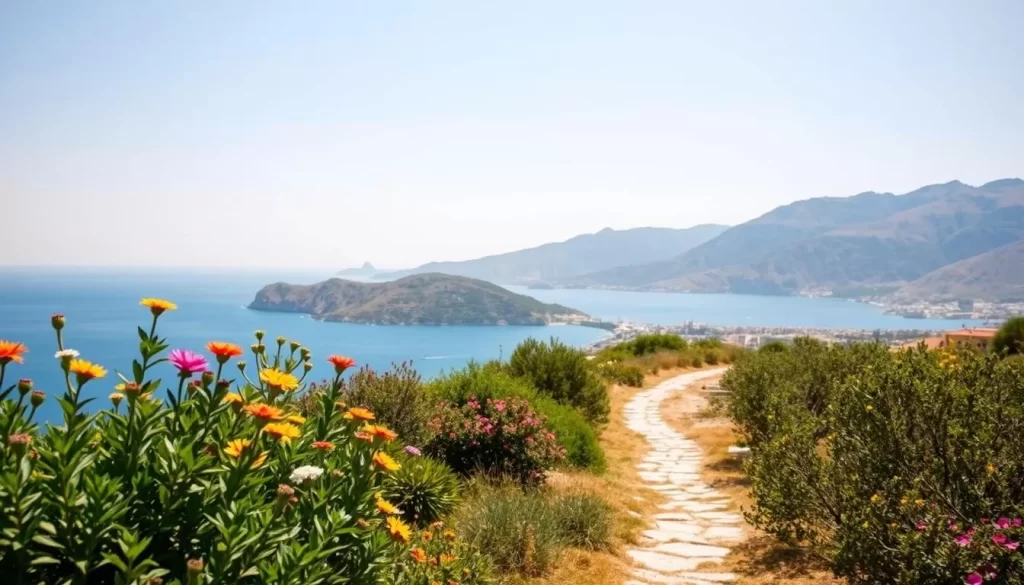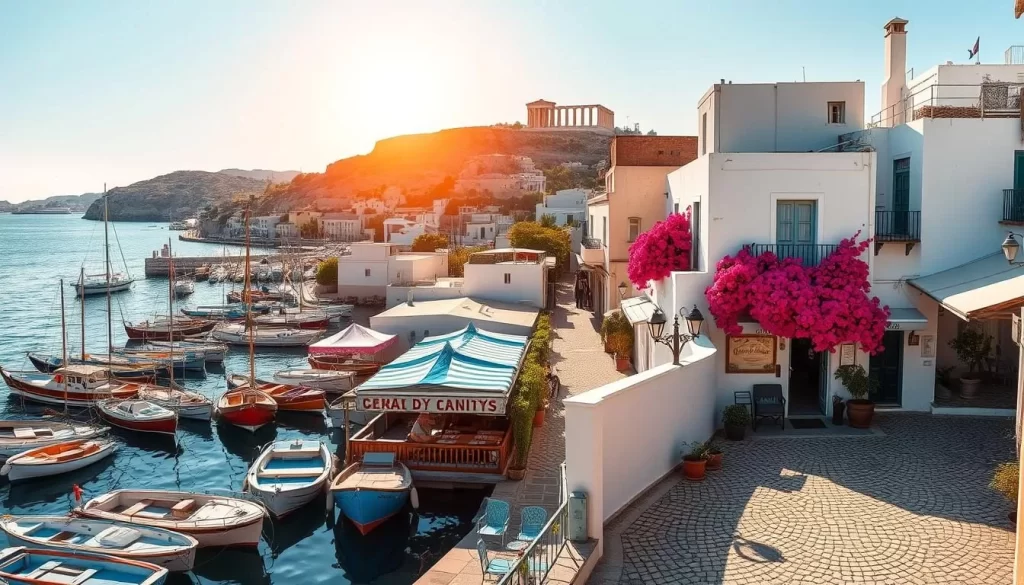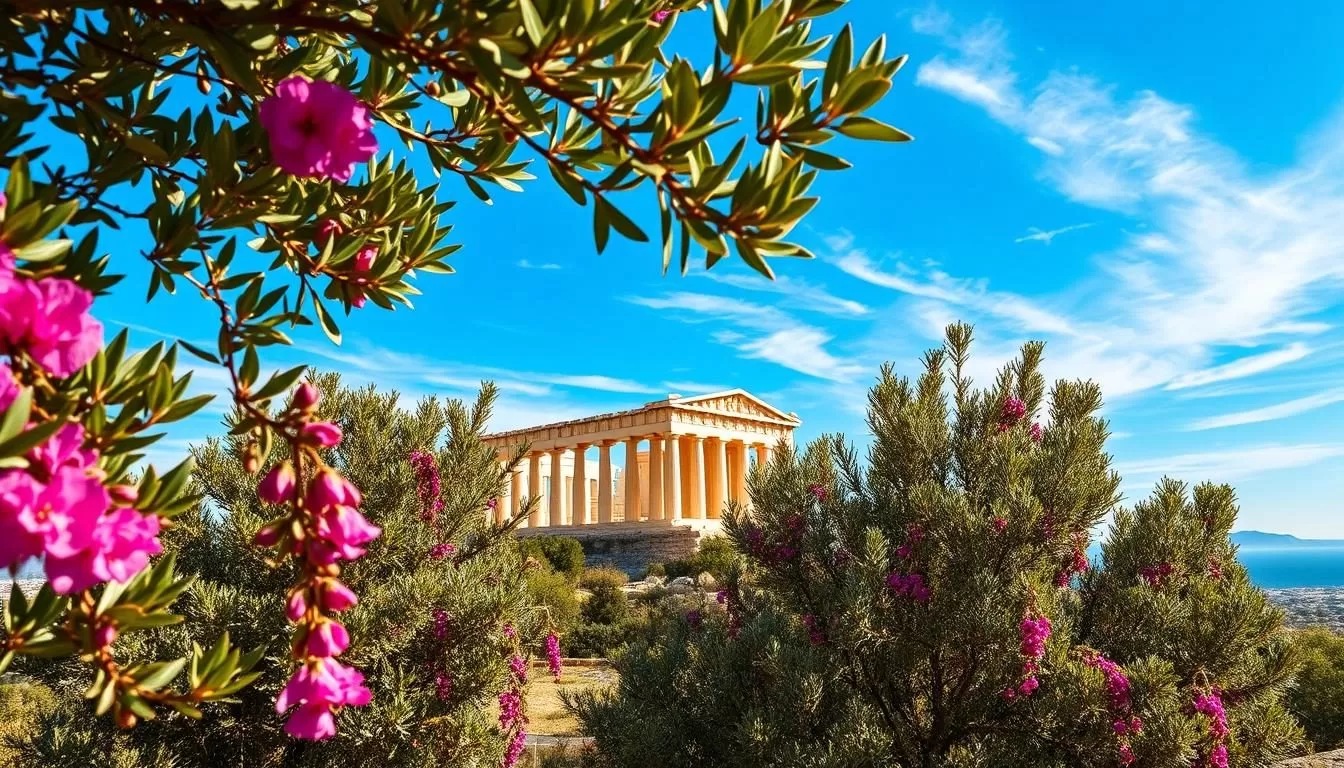✓ Accommodations✓ Flights✓ Rental Cars✓ Tours & Activities
Planning your trip to this Mediterranean destination requires careful consideration of the best time visit. The weather and crowd levels vary significantly throughout the year, impacting your overall experience. Choosing the right season ensures you enjoy pleasant temperatures and avoid peak tourist hassles.
Spring (April to June) and autumn (September to October) are ideal for mild weather and fewer crowds. During these months, temperatures range from 15°C to 29°C, making outdoor activities like sightseeing and island hopping enjoyable. In contrast, summer (July and August) brings intense heat and crowded attractions, while winter (January and February) is colder and rainier.
Timing your trip wisely allows you to explore ancient wonders, relax on stunning beaches, and immerse yourself in the local culture without the stress of peak-season crowds. Whether you’re seeking a vibrant summer adventure or a tranquil autumn escape, understanding the seasonal dynamics ensures a memorable journey.
Introduction: Setting the Stage for Your Greek Adventure
Timing your trip can make or break your experience in this Mediterranean gem. The season you choose directly affects the weather, crowd levels, and overall enjoyment of your journey. Whether you’re exploring ancient ruins or relaxing on pristine beaches, understanding the seasonal dynamics is key.

Why Timing Is Key for a Perfect Trip
Different seasons bring unique experiences. Spring and autumn offer mild temperatures, making outdoor activities like sightseeing and island hopping enjoyable. In contrast, summer can be intense, with soaring heat and packed attractions. Winter, while quieter, may limit some activities due to cooler and rainier conditions.
Choosing the right time ensures you avoid the crowd while still enjoying vibrant cultural sites. For example, visiting the Acropolis early in the morning or during off-peak months can provide a more personal experience.
How Weather and Crowds Impact Your Experience
The weather plays a significant role in your travel comfort. Summer temperatures often exceed 30°C, which can be challenging for extended outdoor exploration. On the other hand, spring and autumn offer a pleasant balance, with temperatures ranging from 15°C to 29°C.
Crowds also vary by season. July and August see the highest tourist activity, while spring and autumn are ideal for exploring without crowd congestion. Planning your trip during these shoulder seasons ensures a more relaxed and immersive experience.
| Season | Weather | Crowd Level | Best For |
|---|---|---|---|
| Spring | Mild (15°C – 25°C) | Low to Moderate | Sightseeing, Outdoor Activities |
| Summer | Hot (30°C+) | High | Beaches, Festivals |
| Autumn | Mild (15°C – 29°C) | Low to Moderate | Cultural Exploration |
| Winter | Cooler (10°C – 15°C) | Low | Indoor Museums, Local Life |
By aligning your travel dates with the right season, you can enjoy a balanced and memorable adventure. Whether you prefer the energy of summer or the tranquility of autumn, thoughtful planning ensures your trip is everything you imagined.
Understanding Greece’s Mediterranean Climate
Greece’s weather patterns vary significantly across regions and months. The Mediterranean climate shapes your travel experience, offering mild winters and hot summers. Whether you’re exploring the mainland or island hopping, understanding these patterns ensures a comfortable and enjoyable trip.

Regional Variations and Weather Patterns
Greece’s geography creates distinct climate zones. The southern regions, including islands like Crete and Rhodes, enjoy milder winters with average temperatures around 50°F to 53°F. In contrast, northern areas experience cooler conditions, especially in the mountains.
During summer, southern regions see temperatures soaring to 86°F or higher. Coastal areas benefit from sea breezes, making them more comfortable than inland regions. These variations allow you to choose destinations that match your weather preferences.
Seasonal Shifts: From Mild Winters to Hot Summers
Spring and autumn are ideal for pleasant weather. In April, average temperatures hover around 60°F, rising to 69°F in May. These months are perfect for outdoor activities like hiking and sightseeing.
Summer brings intense heat, with July and August temperatures reaching 83°F to 87°F. While this is great for beach lovers, it’s essential to stay hydrated and plan activities during cooler parts of the day. Winter, on the other hand, offers cooler and rainier conditions, with average temperatures around 50°F to 53°F.
| Season | Region | Temperature Range |
|---|---|---|
| Spring | Southern Islands | 60°F – 69°F |
| Summer | Coastal Areas | 83°F – 87°F |
| Autumn | Mainland | 67°F – 59°F |
| Winter | Northern Mountains | 50°F – 53°F |
By understanding these seasonal and regional climate patterns, you can plan your trip to align with your preferred weather conditions. Whether you’re seeking the warmth of summer or the mildness of spring, Greece offers something for every traveler.
Athens, Greece: Best Months for a Weather-Savvy Trip
To make the most of your journey, understanding the monthly weather and activity trends is essential. Each month offers unique opportunities for exploring ancient sites, enjoying outdoor adventures, and immersing yourself in local culture. By aligning your plans with the right time, you can maximize your experience while avoiding peak crowds and higher prices.
Month-by-Month Weather and Activity Insights
Spring, from April to June, is ideal for mild weather and fewer crowds. Late April is particularly perfect, with temperatures ranging from 17°C to 27°C. This is a great time for exploring ancient ruins and attending local events like Holy Week.
Summer, from late June to August, brings intense heat, often exceeding 38°C. While this is peak tourist season, early June offers a balance of warm weather and manageable crowds. The Athens Epidaurus Festival is a highlight, showcasing vibrant cultural performances.
Autumn, from September to October, features pleasant temperatures around 25°C on the islands. This is a fantastic time for winery tours and outdoor activities, as well as events like the Corfu Beer Festival.
Winter, from November to March, is cooler and quieter. While some island businesses close, it’s an excellent time for budget travelers to enjoy lower prices and explore indoor attractions.
Balancing Tourist Crowds and Lower Prices
To avoid peak crowds, plan your visits during shoulder seasons like spring and autumn. These periods offer a perfect balance of pleasant weather and fewer tourists. Additionally, lower prices during these months make it easier to stretch your travel budget.
For historical site visits, aim for early mornings or weekdays. This ensures a more personal experience without the hassle of large groups. Booking accommodations and flights in advance can also help secure better deals during off-peak days.
By carefully selecting your travel dates, you can enjoy a rich blend of activities, cultural immersion, and cost savings. Whether you’re exploring ancient ruins or relaxing on a beach, thoughtful planning ensures a memorable trip.
Exploring Top Destinations and Cultural Celebrations
Exploring the diverse landscapes and rich cultural heritage of this Mediterranean destination offers endless opportunities for discovery. From bustling cities to serene island escapes, every corner tells a story. Whether you’re drawn to ancient ruins or vibrant festivals, there’s something for everyone.

Athens and Historic Sites: Ancient Ruins and Hidden Gems
Athens is a treasure trove of historic sites. The Acropolis stands as a testament to ancient civilization, while the Parthenon offers breathtaking views of the city. For a quieter experience, explore lesser-known gems like the Temple of Hephaestus or the Ancient Agora.
Beyond Athens, the mainland is home to Delphi, once considered the center of the world. The ruins here are surrounded by stunning mountain scenery, making it a must-visit for history enthusiasts.
Island Escapes: Santorini, Crete, and More
The islands are synonymous with beauty and relaxation. Santorini’s iconic sunsets and whitewashed buildings are unforgettable. Crete, the largest island, boasts cultural landmarks like the Palace of Knossos and pristine beaches like Elafonissi.
For a quieter escape, consider Naxos or Paros. These islands offer charming villages, crystal-clear waters, and fewer crowds. Each island has its unique charm, making it hard to choose just one.
Cultural celebrations add another layer to your journey. The Armata Festival in Spetses and the Corfu Beer Festival in September are highlights. These events offer a glimpse into local traditions and are perfect for immersing yourself in the culture.
By visiting both the mainland and the islands, you’ll gain a comprehensive understanding of this destination’s rich heritage. For more tips on planning your trip, check out the best time to visit Greece.
Essential Travel Tips for a Smooth Greek Journey
To ensure a seamless and enjoyable journey, having the right travel tips is essential. From packing smart to navigating transportation, these insights will help you make the most of your adventure.
Packing Essentials and What to Wear
Packing for your trip depends on the season. During summer, lightweight clothing is a must, especially for water-related activities. Don’t forget sunscreen, a hat, and comfortable sandals.
For cooler evenings in september october, bring layers like a light jacket or sweater. A reusable water bottle is also handy for staying hydrated during your time explore the islands.
If you’re traveling during the summer crowd season, pack light to manage luggage easily. A small backpack is perfect for day trips and carrying essentials like a camera and snacks.

Navigating Transportation and Avoiding Peak Crowds
Transportation can be busy during peak seasons. Ferries are a popular way to explore the islands, but they often sell out. Book your tickets early to secure a spot.
For a great time without the crowds, consider traveling during the shoulder seasons. September october offers pleasant weather and fewer tourists, making it easier to enjoy popular sites.
In cities, the metro is an efficient and affordable option. Arrive early to avoid rush hours, especially during the summer crowd period.
| Season | Packing Essentials |
|---|---|
| Summer | Light clothing, sunscreen, hat, sandals |
| Spring/Autumn | Layers, light jacket, reusable water bottle |
| Winter | Warm layers, waterproof jacket, sturdy shoes |
By following these tips, you can ensure a stress-free and memorable journey. For more detailed advice, check out this guide to planning your trip.
If you’re traveling solo, this resource for solo female travelers offers additional insights to make your adventure even smoother.
Seasonal Activities: From Beach Days to Festival Nights
Greece offers a dynamic mix of activities that change with the seasons, ensuring every visit feels unique. Whether you’re drawn to the excitement of summer festivals or the tranquility of off-peak beach days, there’s something for everyone.
Outdoor Adventures, Water Sports, and Swimming
During the summer months, the sea becomes a playground for water sports and swimming. Temperatures often soar above 35°C, making it perfect for beach excursions. The Meltemi winds from July to September create ideal conditions for windsurfing and sailing.
For a more relaxed vacation, consider visiting in May or September. The sea remains warm, but the crowds are thinner, allowing you to enjoy the beaches without the hustle.
Festivals and Events: A Cultural Extravaganza
Summer is packed with vibrant events like the Athens and Epidaurus Festival, showcasing theater and music performances. These peak season celebrations are a must-see for culture enthusiasts.
If you prefer fewer crowds, plan your trip around shoulder season events like Greek Orthodox Easter in spring or the Thessaloniki International Film Festival in November.
Balancing Peak and Off-Peak Experiences
To make the most of your vacation, balance peak season excitement with quieter moments. Visit popular sites early in the morning or during shoulder seasons to avoid long lines.
For a mix of adventure and relaxation, explore the islands in late May or early October. The weather is pleasant, and the sea is perfect for swimming.
| Season | Activities | Best For |
|---|---|---|
| Summer (July-August) | Water sports, festivals | Beach lovers, culture enthusiasts |
| Spring (May-June) | Hiking, cultural events | Nature explorers, history buffs |
| Autumn (September-October) | Swimming, wine tours | Relaxation, culinary experiences |
| Winter (November-April) | Indoor museums, local life | Budget travelers, solitude seekers |
Planning your trip around these seasonal activities ensures a well-rounded vacation. For more tips on visiting during the shoulder season, check out this .
Conclusion
Deciding when to visit this Mediterranean country depends on your preferences. Spring and autumn are ideal for mild weather and fewer crowds, while summer offers vibrant energy and bustling places. Winter provides a quieter experience, perfect for exploring indoor attractions and local life.
Each area has its unique charm, from ancient ruins to stunning beaches. The best time to visit varies based on your interests, whether it’s cultural festivals or outdoor adventures. Planning ahead ensures you enjoy the place without the stress of peak-season crowds.
For a deeper dive into local culture, consider extending your stay beyond the typical 24-hour itinerary. This allows you to explore neighborhoods and immerse yourself in the country’s rich heritage. Whether you’re drawn to historical sites or scenic landscapes, Greece offers something for every traveler.
Ready to plan your trip? Check out this guide for essential tips. For a unique experience, explore this 4-day cruise package to make the most of your journey.
The above is subject to change.
Check back often to TRAVEL.COM for the latest travel tips and deals.






